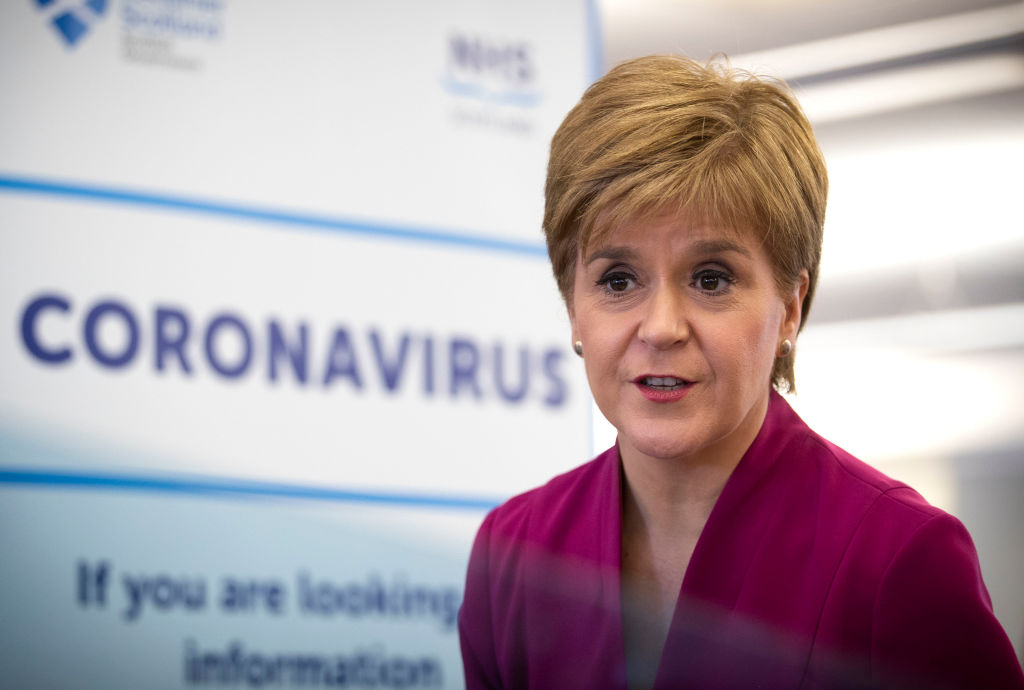Amongst the many postponements and cancellations brought about by coronavirus, perhaps the least disappointing, at least for certain sections of Scottish society, was the SNP’s decision to suspend its demand for a 2020 independence referendum.
Of course, with the government having maintained its firm opposition to ‘Indyref 2’ from day one, it was highly unlikely that the SNP would have got their way in any case. In essence then, the only immediate consequence is that the SNP’s representatives will simply take some time out before amending the lyrics on the song sheet and striking up again. Expect a post-Holyrood election (2021) poll to be the new demand.
With lives and businesses at risk, it’s understandable that the ‘pause’, as the SNP’s cabinet secretary Michael Russell put it in his letter to Michael Gove, wasn’t given huge prominence in the media. But the significance could nonetheless be profound for the future of the union.
Despite recent embarrassments, the SNP are still all powerful north of the border, and support for independence has been recorded at over 50 per cent in several recent polls. With little sign of a revival in fortunes for Labour or the Tories in Scotland, had this current crisis not come along, pressure for another vote might have eventually proved irresistible. And who could confidently say the supporters of independence would not have edged it?
As it is, any future Scottish independence referendum will now take place once this current situation is resolved; it will surely be heavily influenced by the success or failure of the UK government’s strategy. The sheer scale of the crisis has demanded a UK wide plan of action from a strong central authority. And whether the government’s current approach works or not will ultimately provide a new yardstick with which to judge the efficacy of the Union. If it succeeds and the measures being taken do result in the saving of English, Scottish, Welsh and Northern Irish (or British) lives, then the case for breaking up the UK will be much harder to make.
Economically the case for independence could take a huge hit too. Making the figures look plausible for an independent Scotland was always the hardest part of the nationalist’s case, and probably decided the issue in 2014. But with debt now likely to be swollen to gargantuan proportions as a result of the measures being taken to combat the economic hit, the argument for exiting the UK and being lumbered with a significant chunk of that liability – along with all the other start-up costs involved in establishing nationhood – could become simply untenable. The plummeting oil price all but eliminates one potential counter argument.
Then there is the SNP’s commitment to seeking to take an independent Scotland back into the EU, on the same terms as the UK’s former membership, if that could even be achieved. This would also be a far tougher sell post-pandemic. With even the standard bearers of free movement Germany now barring entry from neighbouring countries, the virtues of nations having control of their own border policy, not to mention their own agriculture, will be considerably strengthened.
An effective management of the crisis could also lead to a reinvigoration of the spirit of Union. David Starkey remarked in a recent interview that he feared break up was inevitable given the loosening of the bonds forged by empire and two world wars. An instinctive attachment to the Union was becoming a sepia-tinted folk memory cherished only by the older generation, who had either experience of the second World War or at least the hard ‘we’re all in this together’ early years of post-war rationing and rebuilding. Some of that feeling engendered by a common enemy, collective hardship and shared purpose could be regenerated over the coming months. It is significant that Boris Johnson has referred to his current administration as a ‘wartime government’.
Finally there is the question of proportion. With an extremely powerful devolved parliament, and no restrictions on cultural freedom, it could be argued that Scotland is already, in many ways, an independent country, so the appeal of pure independence was always partly romantic; it was about feeling rather than fact. For the more idealistic, younger perhaps, supporters of independence, the break up of the Union seemed like a great adventure, like casting off the shackles of a stale, exhausted marriage to strike out on your own.
In the face of the apparent seriousness of a national health emergency involving every single citizen in every corner of the UK in the same way, the superficiality of this attraction may dawn on even the most starry eyed separatist. And dreamy notions of independence and freedom may begin to pall in comparison to the merits of a solid, if unexciting marriage, to a partner who may annoy you much of the time – but who’s there when you need them.







Comments